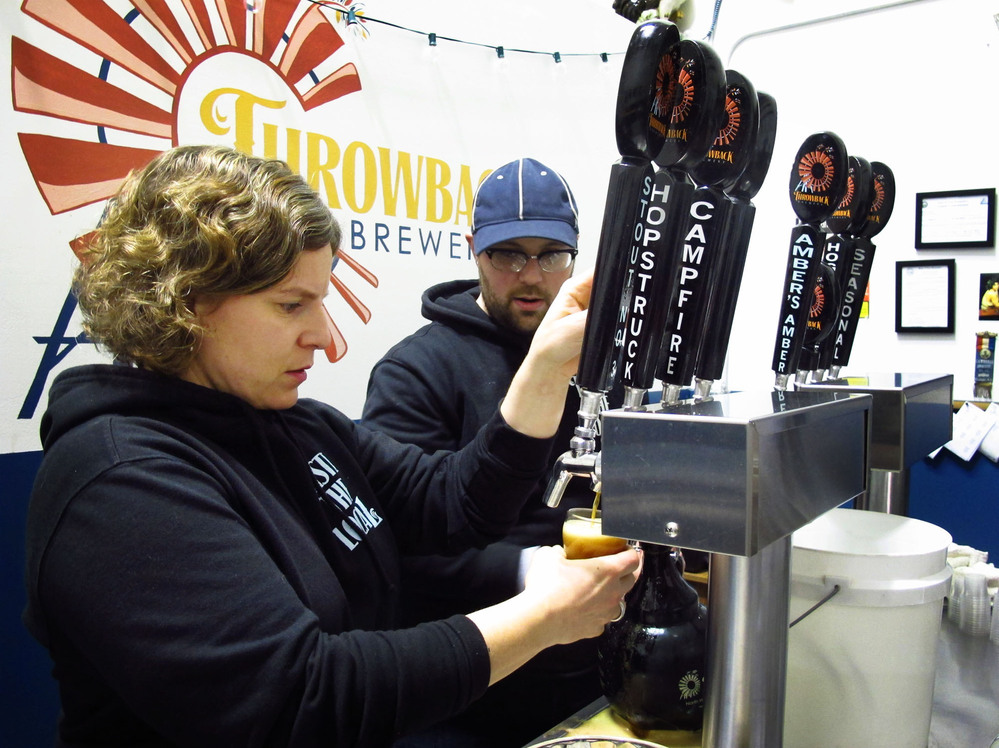 Enlarge image i
Enlarge image i Throwback Brewery co-owner Nicole Carrier and assistant brewer Chris Naro pour beer for customers at their North Hampton, N.H., taproom.

Throwback Brewery co-owner Nicole Carrier and assistant brewer Chris Naro pour beer for customers at their North Hampton, N.H., taproom.
As beer drinkers demand increasingly obscure beers with ingredients like jalapenos or rhubarb, smaller and smaller breweries are stepping up to the plate. New Hampshire is one state helping these brewery startups get off the ground, with new laws that make it easier for small-scale breweries to obtain licenses and distribute their craft beers.
Among those benefiting: Nicole Carrier and her partner, Annette Lee, of North Hampton, N.H. A year and half ago, they were just enthusiastic home brewers. Now, they spend much of their time rinsing equipment and mixing ingredients at their brewery, Throwback. As in, a throwback to the days when communities were smaller, and all food was local food.
Carrier still works for IBM, while Lee left her job as an engineer to start the brewery. With two full-time employees, Carrier and Lee produce 360 gallons of beer a week. That's about what bigger craft breweries throw away.
"Annette is an engineer by her background, and we call it a 'Frankenbrewery' because we've found different pieces and she sort of engineered them together," Carrier says.
About 100 of these so-called nanobreweries have sprouted up across the country. But in many places, starting one can involve a lot of red tape, thanks in part to Prohibition-era liquor laws. New Hampshire is the first state to try to change that.
Despite pushback from big beverage manufacturers like Anheuser-Busch, the state has begun lowering the barrier to entry for people like Carrier and Lee. Today, seven nanobreweries are open in New Hampshire.
These tiny breweries are proliferating, but they may be hard to sustain.
"The thing about nanobreweries that's always a challenge is they run out of products," says Tom Brock Jr., who buys beer for an upscale national grocery franchise and stocks Throwback at his New Hampshire stores. He finds small breweries unreliable and worries the novelty that makes them trendy may ultimately make them unsustainable.
"A lot of folks will look at nanobreweries, and they're like, 'Well, I had all their lineup, and I'm going to go on to something new,' " Brock says.
If they're going stick around, he says, good nanobreweries may not stay "nano" for long.
And it's true that Carrier and Lee at Throwback will be moving to a bigger facility soon. But selling as much beer as possible to as many people as possible? That's just not their style. Carrier and Lee buy most of their ingredients within a 200-mile radius of coastal New Hampshire, and they want to limit their sales to within that radius, too.

The Salt
Hey Locavores, Are You Creating Jobs?
"So if a lot of people around here are that thirsty, we'll get past a nanobrewery, but no, you won't find us in California, or even New York," Carrier says.
Throwback Brewery is in a warehouse park, far from any downtown. That doesn't stop five or six people from coming in to try a Chipotle Porter or Fennel Flower Stout on a Tuesday evening.
"It is really neat to be able to support the local farmers and keep business in New Hampshire, or local, within a couple states here," says customer John Straw, who buys a glass of beer and a jug to go every week.
Carrier says that while the locavore mission is probably good for business, she hopes the beer will speak for itself.
And next on the docket for Carrier and Lee? Opening a "Beer and Breakfast" on their farm across the street.
Emily Corwin is a reporter for StateImpact New Hampshire. StateImpact is a collaboration between NPR and member stations examining the effect of state policy on people's lives.
No comments:
Post a Comment